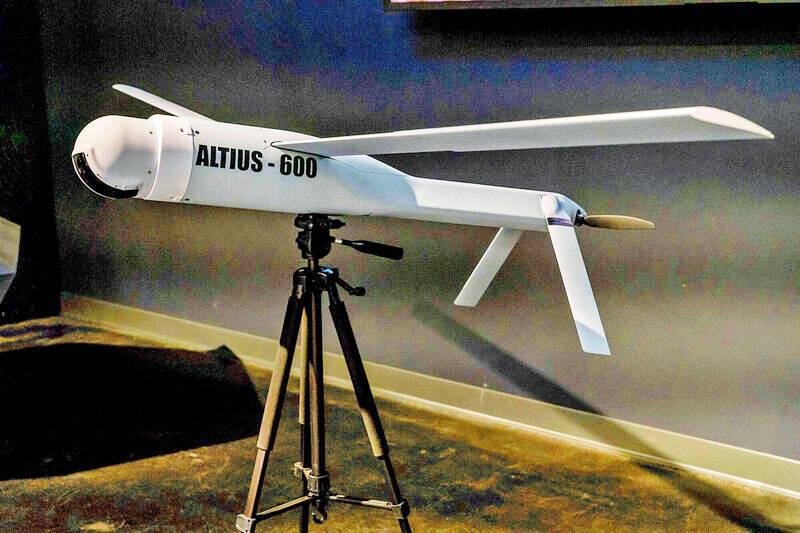Taiwan is stepping up plans to create self-sufficient supply chains for combat drones and increase foreign orders from the US to counter China’s numerical superiority, a defense official said on Saturday.
Commenting on condition of anonymity, the official said the nation’s armed forces are in agreement with US Admiral Samuel Paparo’s assessment that Taiwan’s military must be prepared to turn the nation’s waters into a “hellscape” for the Chinese People’s Liberation Army (PLA).
Paparo, the commander of the US Indo-Pacific Command, reiterated the concept during a Congressional hearing in Washington on Wednesday. He first coined the term in a security conference last year.

Photo: Bloomberg
The hellscape strategy refers to utilizing uncrewed aerial vehicles, boats, submersibles and loitering munitions to conduct saturation strikes or precision attacks against high-value targets to attrit or paralyze the PLA invasion fleet, the official said.
Such attacks are cost-effective, require a comparatively small number of troops and could potentially overwhelm the defensive systems of a larger adversary, they said.
As the Sea-Air Combat Power Improvement comes to a close, the Ministry of National Defense is mulling significant investments in creating a domestic capability to sustain the mass production of uncrewed vehicles, components, guidance kits and related pyrotechnics, the official said.
Observations of foreign conflicts suggest that modern warfare consumes uncrewed vehicles and loitering munitions at rates that strain the capabilities of any defense industrial base, they added.
The military tentatively plans to develop four types of combat drones consisting of a short-ranged direct attack model, a loitering munition model, a vertical takeoff and horizontal airlift-capable model, and a cost-effective type with capabilities comparable to guided missiles, they said.
The ministry would also place thousands of additional AeroVironment Switchblade 300 and Anduril Altius-600M orders from the US to complement planned indigenous systems, the official said.
Officials have yet to determine if drones would be funded via a special program or as part of the ministry’s recurring budget, they added.

POSITIVE DEVELOPMENT: Japan and the US are expected to hold in-depth discussions on Taiwan-related issues during the meeting next month, Japanese sources said The holding of a Japan-US leaders’ meeting ahead of US President Donald Trump’s visit to China is positive news for Taiwan, former Japan-Taiwan Exchange Association representative Hiroyasu Izumi said yesterday. After the Liberal Democratic Party’s landslide victory in Japan’s House of Representatives election, Japanese Prime Minister Sanae Takaichi is scheduled to visit the US next month, where she is to meet with Trump ahead of the US president’s planned visit to China from March 31 to April 2 for a meeting with Chinese President Xi Jinping (習近平). Japan and the US are expected to hold in-depth discussions on Taiwan-related issues during the

‘LIKE-MINDED PARTNER’: Tako van Popta said it would be inappropriate to delay signing the deal with Taiwan because of China, adding he would promote the issue Canadian senators have stressed Taiwan’s importance for international trade and expressed enthusiasm for ensuring the Taiwan-Canada trade cooperation framework agreement is implemented this year. Representative to Canada Harry Tseng (曾厚仁) in an interview with the Central News Agency (CNA) said he was increasingly uneasy about Ottawa’s delays in signing the agreement, especially as Ottawa has warmed toward Beijing. There are “no negotiations left. Not only [is it] initialed, we have three versions of the text ready: English, French and Mandarin,” Tseng said. “That tells you how close we are to the final signature.” Tseng said that he hoped Canadian Prime Minister Mark Carney

President William Lai (賴清德) yesterday bestowed one of Taiwan’s highest honors on Saint Vincent and the Grenadines (SVG) Ambassador Andrea Clare Bowman in recognition of her contributions to bilateral ties. “By conferring the Order of Brilliant Star with Grand Cordon on Ambassador Bowman today, I want to sincerely thank her, on behalf of the Taiwanese people, for her outstanding contribution to deepening diplomatic ties between Taiwan and SVG,” Lai said at a ceremony held at the Presidential Office in Taipei. He noted that Bowman became SVG’s first ambassador to Taiwan in 2019 and

A man walks past elementary school artworks at the Taipei Lantern Festival in Ximen District yesterday, the first day of the event. The festival is to run from 5pm to 10pm through March 15.